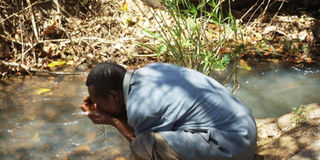Loans to support access to water

A man drinks water from the spring in Napak District. It is estimated that 80,000 people lack access to safe water in Karamoja. PHOTO BY Stephen Ariong
What you need to know:
In a number of rural and some urban settings, access to clean water is a challenge. However, Water.Org in partnership with three financial institutions has come out to fight against poor sanitation in Uganda.
When Justine Akello started her nursery school in GuluTown’s Layibi neighbourhood three years ago, one of her biggest challenges was that she didn’t have proper washrooms for his pupils. Akello’s pupils had to use old portable toilets that had been abandoned nearby Layibi Primary School, an absurd situation which not only exposed her pupils to health risks but also stopped many people from sending their children to her school.
It was not until July when Akello was able to find funds to construct proper washrooms for her nursery school, after learning that Post Bank had introduced a loan purposely for helping people to access proper water and sanitation facilities. Akello got a Shs2m loan, to which he added Shs600,000 to construct a proper latrine for her school.
In Kabale District’s Rubaare County, Global High School Omugyenyi, has been able to connect safe water using the same WASH loan Akello used for his nursery school in Gulu. Global High School was founded eight years ago, but until July it has had to rely on water flowing from natural sources in the nearby wetlands, which has been particularly challenging as Rubaare is a fairly dry area. It was after hearing of the Post Bank WASH loan introduced that the director of the school, Aggrey Byarugaba, was able to set up a collection facility to harvest rain water.
This is the story of a new type of credit facility introduced in the country last year, where loans are provided to people specifically to improve their access to clean water and consequently their sanitation too.
Also the story of how the provided credit is turning around life for an increasing number of people, and how much government and the civil society are hopeful that this new type of loan will go a long way in improving the sanitation landscape in the country.
Brainchild of Water.Org
The whole process of providing credit is a brainchild of Water.org, a USA-based charity NGO whose mission is to bring clean and safe drinking water to everyone in the world. Water.org fundraises money from a wide array of sources (mostly in the USA) to support its activities in the eight countries where it works, namely Uganda, India, Bangladesh, Kenya, Ethiopia, Ghana, Haiti and Honduras.
Among the several ways in which Water.org works is the provision of grants to communities needing access to clean water, engagement of governments to take effort, as well as working with financial service providers to avail credit for water and sanitation causes.
Particularly explaining how they work with financial service providers to extend credit for water and sanitation causes, Water.org’s Regional Director for East Africa, Patrick Alubbe explains: “Our aim is to put microfinance tools to work in the water and sanitation (WASH) sector. We ensure financial institutions can provide loans for water and sanitation to individuals and communities who are in need. The loan funds are jointly provided by us and the financial institutions.”
Partners
Water.org works with different financial institutions in the eight countries where it operates, and in Uganda it works with three. PostBank is the major institution working with Water.org, while the other two are Finca Uganda Ltd and Pal Microfinance.
Explaining how the project works in Uganda, PostBank’s head of credit, Mr Patrick Woyaga says, “As long as one has the ability to pay back, we lend money from as low as Shs100,000 upwards, at a very low interest rate and with a repayment period of up to 36 months.”
Among the things for which they lend the money, Mr Woyaga names connection to piped water networks, rain water harvesting, tapping gravity flow water, or accessing underground water to enable flow to the surface and subsequent distribution to accessible points.”
Providing needed intervention
Statistics from the ministry of water and environment indicate that access to safe water supplies throughout the country is at 65 per cent and access to improved sanitation is at 48 per cent, meaning that more than half of all residents in Uganda do not have access to improved sanitation, share overcrowded pit latrines or practice open defecation. And according to the World Bank, because of this situation, Uganda annually loses Shs389b to problems borne by poor sanitation.
Water Minister, Ephraim Kamuntu, says these unfortunate statistics clearly illustrate the task of providing the population with access to clean water is immense, and says the current innovation by PostBank and Water.org is very welcome.
Engineer Christopher Tumusiime of the Directorate of Water Development at the Ministry of Water and Environment added, “We are glad that as government, we have a partner giving us a hand to improve the water and sanitation sector. Many people out there have the ability to pay for their own water connections without waiting for government which sometimes is slow as it has a very wide area to address, and in this case, it is great service for them if we have a partner willing to help them.”




